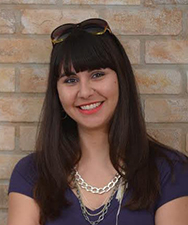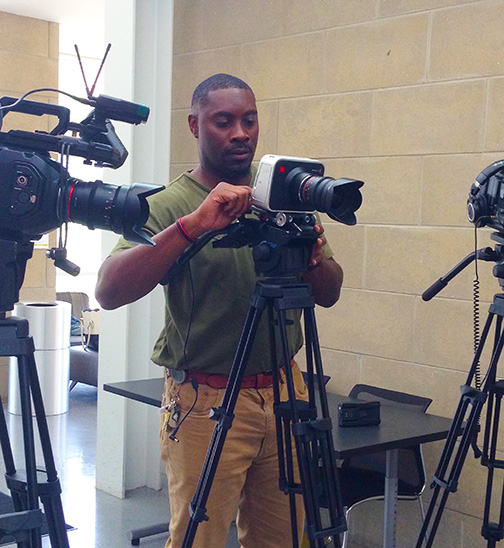by Jaclyn Y. Garver
Ivy Tech Community College Northeast
Fort Wayne, IN

One incredible asset at Ivy Tech Northeast is our media services specialist. In non-Ivy Tech terms that translates into “videographer.” Zeke Bryant has worked for the local NBC and PBS stations in Fort Wayne, Indiana. While he works at our college, he also produces and directs sports events at the Allen County War Memorial Coliseum, a huge event and sports venue in town. At PBS, he was part of an Emmy-winning team: He did the graphics for a short video about the Little River Wetlands.
Zeke has collaborated on a variety of Ivy Tech video projects:
• For our academic programs, asking graduates to share their stories on camera: Why did you choose Ivy Tech? Where do you work now? How did we help you get there?
• For our largest fundraiser of the year, showing donors where their money goes, how they make things possible for students that would never be possible otherwise.
• For an entrepreneurial competition, letting finalists give the background of their businesses so they can spend the competition getting into the nitty gritty of their business plans instead of sharing how they got started or why.
 As a college, we’re lucky, I know. Not all colleges – especially community colleges – have a Zeke. But that’s not to say video production is out of the question. Looking to dabble in video, too? Here are some tips for non-videographers from a recent interview with Zeke.
As a college, we’re lucky, I know. Not all colleges – especially community colleges – have a Zeke. But that’s not to say video production is out of the question. Looking to dabble in video, too? Here are some tips for non-videographers from a recent interview with Zeke.
Q: What’s an easy-to-use, affordable camera?
Zeke: A DSLR (digital single-lens reflex) camera – it combines one lens with a digital imaging sensor. Or, as professional a camera as you can get. Best Buy has them, but they may not have the professional-grade ones, like a Canon Rebel, which can capture video. If you’re a multimedia person, you’re going to be taking pictures as well as video, so a camera that can do both is ideal. Canon or Nikon DSLR cameras would be a good starting point.
Those cameras don’t come with lenses, so you’ll have to purchase them separately. You can pick up everything for about $2,000-$2,500.
Q: What are some necessary add-ons?
Zeke: The following items are pretty much essential:
1) Memory cards – Once you find a camera, it’ll suggest what size card to get. Keep in mind that a card you have on hand to save files on your computer may not be large enough to handle video files or large picture files.
2) A microphone
3) A light kit – Here, you can get away with a cheaper option and upgrade later. The kit should include a tripod for the light, the light itself and a softbox – which fits over the light and diffuses it so it’s not so harsh.
4) Batteries
5) Lenses – In the DSLR camera world, you have prime lenses and zoom lenses. Prime lenses don’t zoom. The benefit here is that you have more control over your subject, how much light you allow in, technical details like f-stops and apertures. I would recommend a zoom lens. A good starter size is one with a 17 mm to a 50 mm range of zoom. The 17 mm is very wide, like a fisheye view. A 50 mm lens offers a good medium-to-close distance.
6) Tripod – You get what you pay for. If you go cheap, expect something flimsier, that isn’t as steady or durable. I would spend a minimum of $150 to $200 on a tripod. It’s one of the pieces that will take a beating. All my tripods did pretty great until I had to go through an airport overseas. That’s when one finally broke.
7) A good computer for editing
Q: Where’s the best place to find this stuff?
Zeke: B&H is a great place to purchase equipment and where most of mine comes from. When you click on anything, like a camera, it’ll have suggestions for you: accessories, cards, lenses or batteries. Best Buy may have the higher-grade cameras available online.
Q: What’s good software for video editing?
Zeke: The Adobe Creative Cloud Suite. It includes:
• Adobe Premier, video editing software
• Photoshop for photo editing
• Illustrator to create graphics
You can get the whole suite with an educational discount.
Q: How do I afford all this equipment?
Zeke: Pursue grants as much as possible. They’re out there. You just have to do research. Talk to your foundation or grant writer. On a yearly basis, probably 98 percent of our equipment is grant funded.
Q: What are some good resources to use for ideas?
Zeke: I’ve had success with:
• Vimeo.com – It’s a good search engine. It’s like YouTube, but YouTube bumps down the quality of the video. Vimeo videos are high quality, so a lot of professionals use it for their projects, including video tutorials.
• Creative COW – A lot of people share tips like “here’s a new camera coming out,” “here’s an update.” You can type, “How to make Jaclyn’s face purple,” in the search box and it’ll find that for you.
• No Film School – A forum that gives you tips and tricks like, “I have a Canon 70 camera. How do I … ” Or, “I want to sync audio and video, and my audio is on a different source. What do I do?”
• And, of course, never underestimate the power of Google.
Jaclyn Y. Garver is the media relations and communications coordinator for the Northeast campus of Ivy Tech Community College in Fort Wayne, Indiana.


STAY CONNECTED